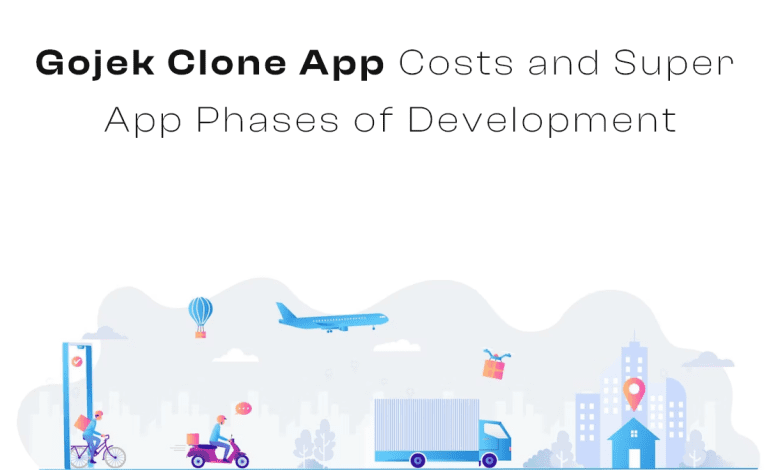Gojek Clone App Costs and Super App Phases of Development

Developing a Gojek clone app involves several phases, each with its tasks and considerations. Here are the typical phases of development and some factors to consider regarding the costs:
Market Research and Analysis
In this phase, you conduct market research to understand the target audience, identify competitors, and assess market demand. The cost will depend on the extent of research required and whether you choose to outsource this task to a market research firm.
Conceptualization and Planning
Define the core features, services, and functionalities of your Gojek clone app. Create a comprehensive plan outlining the app’s structure, user flow, and monetization strategy. The cost will vary based on the complexity of your app and the level of detail required in the planning phase.
UI/UX Design
Develop wireframes, mockups, and visual designs for your app’s user interface (UI) and user experience (UX). The cost will depend on the complexity of the designs, the number of screens, and the need for customizations.
Frontend and Backend Development
This phase entails the basic coding and development of the app. Frontend development focuses on creating the user-facing interface, while backend development deals with the server-side logic and integration of various services. The costs will depend on the development platform (iOS, Android, web), the number of features, and the complexity of the app’s architecture.
Testing and Quality Assurance
Thoroughly test the app to identify and fix any bugs, issues, or usability problems. Quality assurance (QA) testing helps ensure the app functions correctly and delivers a smooth user experience. The cost will depend on the testing scope required and the QA process’s duration.
Deployment and Launch
Prepare the app for deployment to the respective app stores (Google Play Store, Apple App Store). It involves meeting the platform guidelines, setting up developer accounts, and submitting the app for review. The cost will typically include app store fees and additional charges for submission or review processes.
Post-launch Updates and Maintenance
Once the app is live, you must gather user feedback, address any issues, and provide regular updates to enhance the app’s functionality and performance. The cost will depend on the frequency and complexity of updates and ongoing maintenance requirements.
Regarding the costs of developing a Gojek clone app, it can vary significantly based on several factors, including the complexity of the app, the number of features, the platforms targeted (iOS, Android, web), the development team’s location and expertise, and other miscellaneous expenses like app store fees or third-party service integrations. It is best to consult with an app development company or professional developers who can provide accurate cost estimates based on your specific requirements and the current market rates.
Do You Need A Super App Like A Gojek Clone App?
Developing a Super App like a Gojek clone involves thorough planning, design, and development to ensure a smooth user experience and efficient service delivery across all integrated services. The clone app aims to replicate the success and functionalities of the original app, customized to fit specific market needs.
It’s important to consider the target market, business model, and technology stack while creating a Gojek clone app. Moreover, complying with local regulations and addressing the specific needs of the users in the targeted regions is crucial for its success.
Building a Super App like a Gojek clone can be complex and resource-intensive. Therefore, it’s essential to work with a skilled development team, or company experienced in building such multi-service platforms.
Benefits of Super Apps like Gojek for Your Business:
Super Apps like Gojek offer several benefits for businesses adopting this model. Here are some key advantages:
Increased Customer Engagement
Super Apps consolidate multiple services into a single platform, providing users convenience and a seamless experience. By offering various services within one app, businesses can engage customers more effectively and increase their overall usage and engagement.
Expanded Customer Base
Super Apps can potentially attract a wide range of customers seeking various services. By offering diverse services, businesses can tap into different customer segments and expand their customer base.
Cross-Selling and Upselling Opportunities
Super Apps allow businesses to cross-sell and upsell their services to existing customers. For example, a ride-hailing user may be prompted to use food delivery or other services within the same app, increasing the average revenue per user.
Efficient Operations
Super Apps centralize operations by integrating various services into a single platform. It can increase operational efficiency, streamline processes, and better business resource utilization.
Data Insights and Personalization
Super Apps gather data on user behavior, preferences, and usage patterns across different services. This data can be leveraged to gain valuable insights into customer behavior and preferences, allowing businesses to personalize their offerings and marketing strategies.
Partnership Opportunities
Super Apps often collaborate with partner businesses to provide additional services. It allows businesses to form strategic partnerships and expand their reach through the Super App’s ecosystem.
Brand Visibility and Recognition
Being part of a Super App ecosystem can enhance a business’s brand visibility and recognition. By associating with a well-known Super App, businesses can benefit from the app’s reputation and reach a wider audience.
Streamlined Payments and Transactions
Super Apps typically provide integrated payment systems, making it easier for users to transact across different services. This convenience can lead to increased usage and customer satisfaction.
Continuous Innovation and Adaptability
Super Apps are known for continuously innovating and adding new services based on market demand. It keeps the app relevant and allows businesses to adapt and expand their offerings based on changing customer needs.
Competitive Advantage
Adopting a Super App model can give businesses a competitive advantage by providing a comprehensive and all-in-one solution that sets them apart from competitors offering individual services.
It’s important to note that while Super Apps offer various benefits, they also require significant investment, resources, and expertise to develop and maintain. Businesses considering adopting a Super App model should carefully assess their specific market, target audience, and the feasibility of offering multiple services within a single app.
Step-by-Step Gojek Clone Application Methods of Development:
Developing a Gojek clone application involves several steps to ensure a smooth and efficient development process. Here is a step-by-step guide outlining the methods of development for a Gojek clone application:
Define the Scope and Requirements
Identify the core features and services for your Gojek clone app. Determine the target market, user demographics, and specific needs to tailor the app accordingly. Create a comprehensive list of requirements and functionalities.
Design and Prototyping
Develop wireframes, mockups, and interactive prototypes to visualize the app’s UI and UX. Ensure a user-friendly interface, intuitive navigation, and seamless user experience. Seek feedback from stakeholders and make necessary iterations to finalize the design.
Backend Development
Set up the server infrastructure and select the appropriate technology stack. Develop the backend logic and APIs to handle user requests, authentication, and data management. Implement database models and establish secure connections.
Integration of Services
Integrate services like ride-hailing, food delivery, grocery delivery, and others based on the defined scope. Implement third-party APIs for payment processing, geolocation, messaging, and notifications. Ensure seamless integration and smooth functionality between different services.
Real-time Tracking and Mapping
Implement real-time tracking features using technologies like WebSockets or Socket. IO. Integrate mapping services like Google Maps API or Mapbox API to display routes, locations, and real-time updates. Enable live tracking of service providers and orders for enhanced user experience.
Payment Gateway Integration
Integrate secure and reliable payment gateways like Stripe, Braintree, or others. Implement secure payment processing, including features like payment authorization, capturing, and refunding.
Deployment and Launch
Deploy the app to relevant app stores (Google Play Store, Apple App Store) and web servers. Follow the respective submission guidelines and ensure compliance with their requirements. Plan and execute a marketing strategy for the app’s launch.
Post-launch Support and Maintenance
Continuously monitor the app’s performance, user feedback, and analytics. Address user concerns, bug reports, and feature requests promptly. Regularly update the app with new features, enhancements, and security patches.
Remember, each step in the development process requires collaboration and coordination between various teams, including designers, developers, testers, and project managers. Following agile methodologies, conducting regular code reviews, and ensuring effective communication throughout the development lifecycle are crucial.
Developing the Cost Of An App Like Gojek
The cost of developing an app like Gojek can vary significantly based on various factors, such as the complexity of features, the technology stack, the development team’s location, and the development time required.
Design and Development
It includes the cost of UI/UX design, frontend development, backend development, API integration, and quality assurance. The complexity of the features, the number of services, and the platforms (iOS, Android, web) supported will impact the cost.
Third-party Integrations
Plan to integrate third-party services such as payment gateways, mapping services, messaging APIs, or cloud services. There may be additional costs associated with licensing fees or usage charges.
Infrastructure and Hosting
The cost of hosting the backend infrastructure and databases on cloud platforms like AWS, GCP, or Azure should be considered. It will depend on server size, storage requirements, and expected traffic.
Project Management and Team
The size and expertise of the development team, including project managers, designers, frontend and backend developers, testers, and quality assurance specialists, will impact the overall cost. The hourly rates of the team members will also vary based on their location and experience.
Maintenance and Updates
After the initial development, ongoing maintenance, bug fixes, updates, and support are essential. Consider the cost of maintaining the app, implementing new features, and ensuring its compatibility with future OS updates and device models.
It’s challenging to provide an exact cost without detailed project requirements, but developing an app like Gojek can range from tens of thousands to hundreds of thousands of dollars or even more for large-scale projects. The development time can take several months to a year, depending on the complexity and scope of the app.
It’s recommended to consult with a professional development agency or software development company to get an accurate cost estimate. They can assess your requirements, provide a detailed proposal, and offer cost estimates based on their expertise and experience building similar applications.
Wrapping Up
Developing a Gojek clone or super app like Gojek involves considerable time, effort, and resources. The costs for building these apps can vary based on the scope, features, technology stack, and development team’s location. It is crucial to work with a reliable development team to ensure the successful development of a Gojek clone app that meets the desired functionalities and delivers a seamless user experience.






